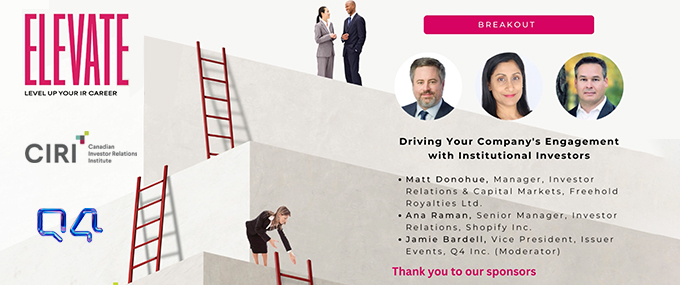Engaging with investors is essential to a public company’s growth and success. In a recent session at the Canadian Investor Relations Institute conference, “Driving Your Company’s Engagement with Institutional Investors,” industry experts shared valuable insights and strategies for effectively targeting, connecting, and maintaining relationships with institutional investors.
The panel included Q4’s VP of Issuer Events, Jamie Bardell, Matt Donohue, Investor Relations & Capital Markets Manager, Freehold Royalties Ltd., and Anna Raman, Senior Manager, Investor Relations, with Shopify.
Targeting the Right Investors
The first part of the discussion focused on identifying and targeting the right institutional investors. Jamie prompted the panel by asking:
- How much time are you spending today with current versus prospective shareholders?
- What do you use to give you insights into prospective investors?
- Are you working through a broker versus going direct?
- Is there an overarching strategy that you have to target?
- How has your target profile shifted in the last few years?
- Have your ESG practice or disclosure factored into which investors you would target?
Key takeaways from the panel discussion:
Defining Investor Personas: Understanding the type of investors that align with the company’s vision and mission is crucial, and during consideration, IR professionals must consider investment style, regional distribution, and institutional versus retail ownership. It requires that IROs provide more detailed briefings and reports to institutional investors while communing with retail investors might involve simplified financial reports, webinars, and Q&A sessions. Understanding the composition of the investor base and preferences of institutional versus retail investors can help tailor communication strategies.
Leveraging Investor Data: In today’s data-driven world, IR professionals have a powerful tool: data and analytics. By harnessing the power of data, companies can gain valuable insights into investor preferences, behaviors, and investment patterns, allowing them to tailor their institutional investor targeting strategies and engage with prospective shareholders more effectively. Companies can use demographic data like investors’ location, investment size, the nature of the investment (e.g., long-term vs. short-term), and even the investor’s industry focus. This information can help companies identify common characteristics among their investors and use these insights to target similar prospective investors.
Nurturing Relationships: The importance of nurturing relationships with shareholders was a recurring theme. Engagement involves proactive communication, hosting investor events, and responding promptly to inquiries. Fostering relationships with shareholders should be seen as more than a one-way communication effort. Incorporating feedback is essential to facilitate these connections, so listening to what investors are saying and incorporating it into your messaging strategy is crucial.
Capital Raises and Investor Base: Collaborating with experienced book runners can help ensure a smooth and successful capital raise. Matt explained book runners could advise on the timing of the raise, the type of securities to issue, and pricing them appropriately to ensure successful subscription while maximizing the funds raised. Companies can build trust and confidence among existing and prospective investors. Openly discussing the use of returns from the capital raise and how it aligns with the company’s strategic goals assures investors about the company’s direction and their investment’s potential returns.
Environmental, Social, and Governance (ESG): Discussions around ESG factors have become more pronounced when engaging with large institutional investors in Canada and the U.S., Matt noted. Anna also weighed in on the importance of ESG, specifically regarding European markets. They recommended incorporating ESG factors into your regular financial reporting. This will demonstrate your company’s commitment to ESG and provide tangible data that investors can use to assess your company’s ESG performance.
Marketing Efforts and Monitoring Success
The conversation evolved into the topics of marketing efforts and monitoring the success of engagement strategies. Jamie prompted the panel with the following questions:
- Have you been going to many conferences recently?
- Will attending conferences or facilitating more Non-Deal Roadshows continue this year and going forward?
- What has been a different approach to meeting with your investors? Have you tried the group meeting format, and if so, what results have you seen?
- How do you monitor the success or lack of success in your marketing efforts?
The speakers shared the following insights:
Conferences and Virtual Meetings: While conferences provide opportunities to meet new investors, advancing technology and virtual platforms have facilitated additional touchpoints. Virtual meetings have become valuable tools for connecting with investors globally, enabling more efficient and cost-effective engagements. Preparation is critical for both in-person conferences and virtual meetings, so the panel suggests researching attendees, identifying potential investors, and scheduling meetings in advance. They also advise IR professionals to be ready to present their company’s prospects, address queries, use interactive features, and follow up after the event.
Relationship Building: IR professionals often facilitate one-on-one meetings between the company’s senior management and institutional investors. Because of this, Anna expressed the importance of preparing C-Suite executives with customized details and feedback for these discussions. Institutional investors appreciate IR professionals promptly responding to their inquiries and providing transparent and honest insights into the company’s operations and financial status. She advised that transparency builds trust, which is vital to any strong relationship.
Group Meetings and Targeted Briefings: Organizing group meetings and targeted briefings for investors can effectively control the narrative and ensure quality conversations. Group meetings provide an efficient forum for companies to disseminate information to a broad audience and address common questions to a broad audience. Targeted briefings, on the other hand, allow for a more customized approach. These briefings can then be tailored to specific groups of investors whose interests, investment philosophies, or ownership stakes align on certain aspects.
Monitoring and Feedback: Direct, candid feedback can provide a wealth of insights into investor sentiments, their perspective on the company’s direction, and their opinion on various aspects of its performance. Whether gathered through one-on-one meetings, group discussions, or structured feedback sessions, these insights are invaluable in identifying areas of strength and understanding where there may be room for improvement. In addition, stock surveillance can help companies track the movements of their shares, understand who is buying and selling, and glean insights into why specific actions occur.
Conclusion
Driving your company’s engagement with institutional investors requires a thoughtful, data-driven approach and a commitment to building long-term relationships. The insights shared by industry leaders like Jamie Bardell, Matt Donohue, and Anna Raman emphasize the importance of understanding and targeting the right investors, nurturing these relationships over time, and leveraging data to tailor your IR strategies effectively.
In a rapidly evolving business landscape, one thing is sure – those who invest time and resources in nurturing their relationships with institutional investors will be well-positioned to drive sustainable growth and success for their companies. See how our investor relations professionals and Q4’s Platform can help support your engagement with investors.


